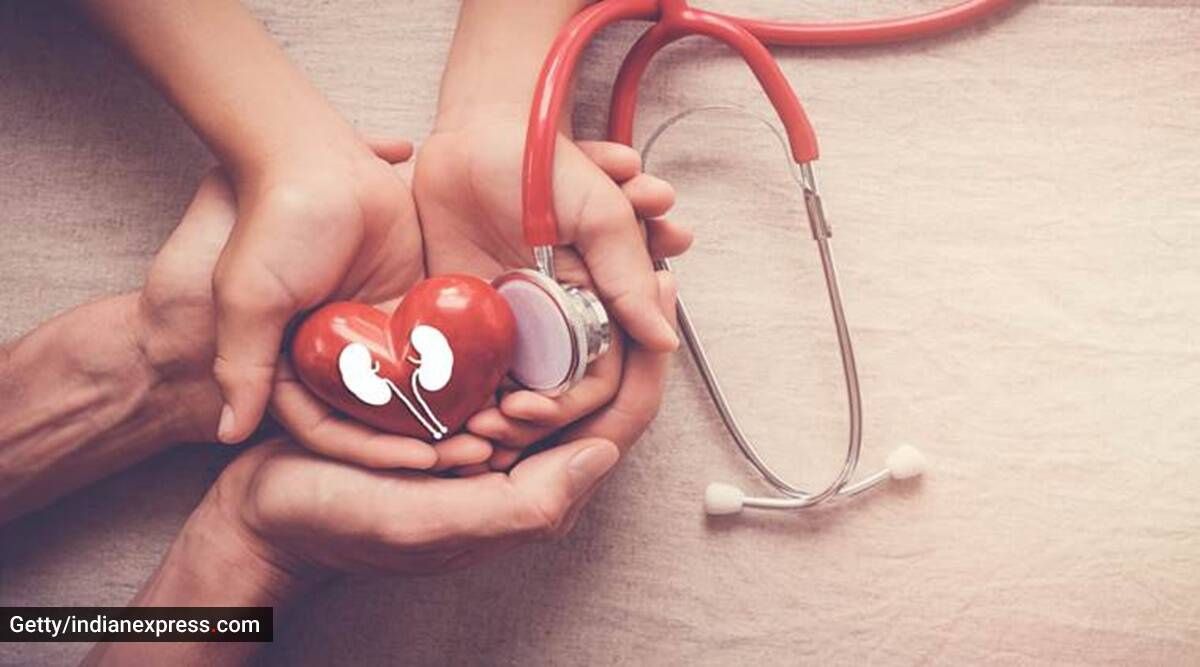📣 For more lifestyle news, click here to join our WhatsApp Channel and also follow us on Instagram
World Kidney Cancer Day 2023: All you need to know about the condition
“Cancer’s stage, the patient’s general condition, and the specifics of the tumour all play a role in the treatment decision,” said Dr Indernath Verma, senior consultant and HOD (Urology) at Primus Super Speciality Hospital
 The significance of World Kidney Cancer Day lies in its mission to educate the public about the risk factors associated with kidney cancer. (Image source: Getty Images)
The significance of World Kidney Cancer Day lies in its mission to educate the public about the risk factors associated with kidney cancer. (Image source: Getty Images)World Kidney Cancer Day is being observed on June 15 this year. The day aims to raise awareness about kidney cancer prevention, early detection and treatment options. Kidney cancer, also known as renal cell carcinoma (RCC), is a type of cancer that originates in the kidneys.
For the unversed, the kidneys are vital organs responsible for filtering waste products from the blood and producing urine. Experts suggest that when abnormal cells begin to grow uncontrollably in the kidney, it can lead to the development of kidney cancer which is said to be one of the most common types of cancer affecting both men and women worldwide.
In a conversation with indianexpress.com, Dr Indernath Verma, senior consultant and HOD- Urology at Primus Super Speciality Hospital said, “The goal of kidney cancer awareness is to inform people about the symptoms, risk factors, and indicators of this disease. Regular screenings for early detection are emphasised, and awareness of treatment choices is encouraged.”
How does kidney cancer occur?
The exact cause of kidney cancer is yet to be known. “There are certain things that can exacerbate the chances of developing cancer in your body like smoking, obesity, high blood pressure, dialysis and a family history of kidney cancer,” said Dr Verma.
What are the symptoms of kidney cancer?
According to Dr Verma, there are usually no signs or symptoms in the early stages of kidney cancer. However, over time, symptoms start to show up, including:
*Back pain or side pain that doesn’t go away
*Weight loss, fatigue and fever
*Appetite loss
*Blood in the urine, which may appear pink or red
Diagnosis
Diagnosis of kidney cancer often involves a combination of medical history evaluation, physical examination, imaging tests (such as CT scans or MRIs), and a biopsy to confirm the presence of cancerous cells, he mentioned.
Treatment
Treatment options for kidney cancer depend on the stage and extent of the disease but may include surgery (partial or complete removal of the kidney), targeted therapy, immunotherapy, radiation therapy, or a combination of these approaches.
“Cancer’s stage, the patient’s general condition, and the specifics of the tumour all play a role in the treatment decision,” said Dr Verma.
 Treatments for kidney cancer may carry a variety of risks and adverse effects. Risks associated with surgery include infection, haemorrhage, and organ damage. (Image source: Freepik)
Treatments for kidney cancer may carry a variety of risks and adverse effects. Risks associated with surgery include infection, haemorrhage, and organ damage. (Image source: Freepik)
He added, “The costing structure for cancer treatment in India varies, depending on the hospital, region, and type of therapy required. By enforcing price controls, offering low-income people insurance coverage or subsidies, promoting generic medications and encouraging research into cost-effective cancer treatments, the government can increase access to cancer treatments. Cost-saving measures for medical treatment include expanding public healthcare infrastructure and facilities.”
What are the ways to prevent kidney cancer?
*Quit smoking
*Maintain a healthy diet and weight
*Manage your blood pressure
*If you are diabetic person, maintain your sugar levels
Recurrence of kidney cancer
Dr Verma said that the stage and aggressiveness of the tumour, among other things, can affect the likelihood of a recurrence after treatment for kidney cancer. “It’s critical to adhere to the advised monitoring strategy, which may call for regular checkups, imaging exams, and blood tests to reduce the risk of recurrence. The risk of recurrence can also be decreased by living a healthy lifestyle, which includes eating a balanced diet, working out frequently, abstaining from tobacco use and excessive alcohol intake, and managing stress,” he added.
He concluded that it is advised to consume a well-balanced diet that is high in fruits, vegetables, whole grains, lean proteins, and low in processed foods when receiving treatment for kidney cancer or while recovering from it. Additionally, it’s crucial to remain hydrated.
📣 For more lifestyle news, follow us on Instagram | Twitter | Facebook and don’t miss out on the latest updates!
📣 For more lifestyle news, click here to join our WhatsApp Channel and also follow us on Instagram


Photos


- 01
- 02
- 03
- 04
- 05






















